This week’s highlights
- Judie Kaberia puts women and girls’ rights onto the op-ed page of the Globe and Mail
- Watch: JHR’s #InternationalWomensDay Webinar
- JHR’s Moment of Truth with ELMNT FM
- This March 16, find out how YOU can get involved in helping countries worldwide recover from the pandemic
- Meet Lynne Chichakian, CBC/JHR trainer
- A new video highlights threats women journalists face – and what to do about them
- Work with JHR ! Four new head office positions available
- Apply Now! The Gordon N. Fisher/JHR Journalism Fellowship at Massey College 2021/2022
- Apply Now ! Media Girlfriends Scholarships for High School Students in Canada
‘In Kenya, journalism has been key to supporting women during the pandemic’ by Judie Kaberia
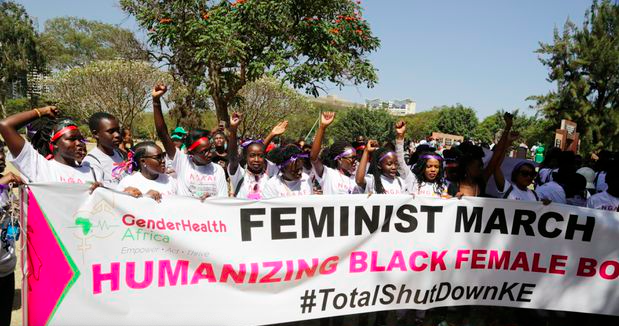
Photo Credit: Globe and Mail
This #InternationalWomensDay, JHR Gender Media Trainer
Judie Kaberia wrote an op-ed in Canada’s
Globe and Mail. In it, she shares how the pandemic has affected women and girls’ rights in Kenya. Among other issues, she outlines a parallel epidemic of teen pregnancy, a function of young girls being locked up at home with potential predators. And she proposes journalism as one of the best and strongest ways that these issues can be prioritized and addressed.
Writes Judie:
“The media is integral to the response against gender-based violence. Journalists can lead by reporting and raising awareness to help change perceptions and policy and to demand justice in order to restore the dignity of the survivors. They should be empowered with skills and knowledge to help them report on gender professionally and with sensitivity.
The challenges that the pandemic represents for women and girls are grave. To meet them requires journalism that looks at the broader spectrum of issues that block girls and women from an equal share of public participation in social, political and economic spheres.
This International Women’s Day, my mind goes to Burkina Faso independence leader Thomas Sankara’s memorable words: “There’s no true social revolution without the liberation of women. May my eyes never see and my feet never take me to a society where half the people are held in silence. I hear the roar of women’s silence.” Working to give these women and girls the platform and attention they deserve is the best way I know to break it.”
To read the full op-ed from the Globe, please see this link here or read it on JHR’s site here.
Watch: Putting the International into #InternationalWomensDay
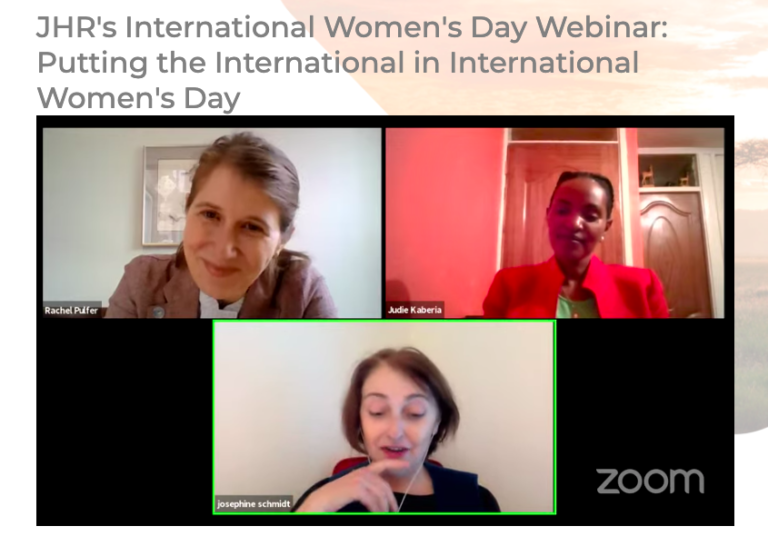
Photo Credit: JHR
This #InternationalWomensDay, JHR Gender Media Trainer
Judie Kaberia, JHR Executive Director
Rachel Pulfer and
New Humanitarian Executive Director
Josephine Schmidt hosted a special webinar on how COVID-19 has disproportionately affected women and girls’s rights worldwide and the leadership role that journalists can play in centering and addressing women’s and girls’ voices and concerns. Watch the webinar again
here.
JHR featured on ELMNT FM’s Moment of Truth on International Women’s Day
On Women’s Day, broadcaster David Moses picked up an edited version of the webinar on his evening show, Moment of Truth. Click here to listen to the broadcast on ELMNT FM, APTN’s radio station in Toronto. Commented the show’s management: “ElMNT fm’s Moment of Truth Show (since our inception two and half years ago) hosted and produced by David Moses, strives to reflect the core truth about Indigenous Human Rights and all human rights from all perspectives covering all sides with candor and fairness. Therefore, on International Women’s Day it only made sense that we partner with an organization such as Journalists for Human Rights, who tirelessly work to raise awareness and make changes for the betterment of fellow journalists and people everywhere.”
How YOU can get involved in the pandemic recovery effort worldwide
Photo Credit: Rubach Wealth
On
Tuesday March 16, at 11:30am, join Journalists for Human Rights’ Executive Director
Rachel Pulfer, War Child Canada Co-Founder and Chair
Dr. Samantha Nutt and Engineers Without Borders Chief Executive Officer
Boris Martin for Living Room Giving: a powerful discussion about the global moment we face and how Canadians can step up to help.
To register, please click here..
Lynne Chichakian – Canadian Trainer with the JHR’s project “Canada World: Voice for Women and Girls”
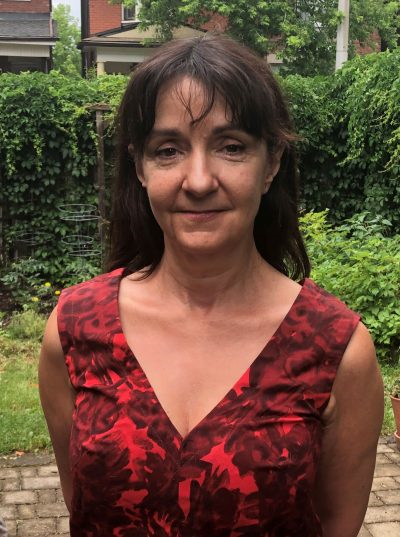
Photo Credit: Lynne Chichakian
Since January of this year, Lynne Chichakian, an experienced CBC journalist, has been working with JHR as an expert trainer to support capacity building of local journalists in Kenya and the Democractic Republic of Congo. This week marks the end of Lynne’s assignment with JHR and we would like to profile her as a way to thank Lynne for her notable contributions to the “Canada World: Voice for Women and Girls” project.
Tell us a little about yourself, your professional background and areas of interest.
I am the mother of two daughters who are beginning to make their way in the world. I have been a journalist for 30 years – I began my career at Global, spent several years at CTV, and am presently working at CBC radio. For most of my years at CBC I was a producer with the Documentary Unit. This gave me the opportunity to work around the world, and spend the luxury of time with stories I cared about.
What led you to want to work with JHR?
I am fortunate to work in an environment that has offered me great training, and generous colleagues who have shared their experiences with me. I felt that I had something to contribute to collaborations with colleagues around the world. The focus on women journalists further grabbed my interest. The stories of women in many places are still untold, and these untold stories are what really deepen our understanding of many of the challenges that people are facing around the world.
What did you like the most about your work with JHR?
With both the Kenya, and DRC teams I have learned about the challenges that they, and other journalists are facing. Helping journalists shape their stories was amazing. The determination of the JHR staff during Covid to find ways of reaching out under very difficult circumstances. I.e. – The internet connection in the DRC sometimes is almost non existent. The ways we all came up with to continue working together resulted in many innovative approaches. I am hoping that some of these new ways of doing things can be maintained to offer JHR an expanded set of options to support the work they do. Finally, one moment that will stay with me happened during one particular midnight seminar we were having. We started discussing the challenges of editors.I felt that we could be having the same conversation in any place I have ever worked. It really drove home for me that journalists are truly a global community united by common purpose.
Journalists for Human Rights would like to thank CBC for its support of JHR’s work internationally, which enables us to integrate trainers of Lynne’s calibre directly into our programming.
A New Video On Threats Women Journalists Face
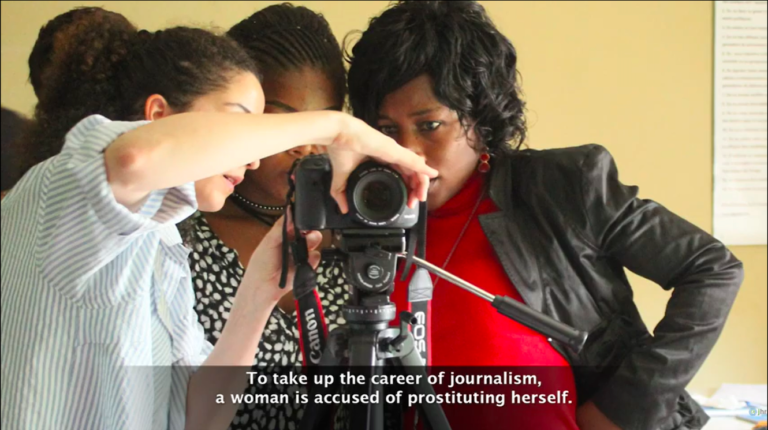
Documentary and film workshop eastern DRC. Photo credit: Margaret Flatley
Available in
English and
French, it shares highlights of a conversation between Indigenous journalist and Ryerson journalism professor
Karyn Pugliese, Congolese journalist and co-founder of the Ecole Technique de Journalisme
Sandra Bashengezi, and Syrian journalist
Nisreen Anabli.
The three discuss the kinds of challenges they have encountered in their journalism, whether they be Indigenous women working in Canadian media, Congolese women working in the Democratic Republic of the Congo or Syrian women covering the conflict in Syria. All three women contributed to a collection of papers on this theme. Entitled
Half The Story is Never Enough, it is available in
English and
French on all three organizations’ websites for download, at
www.jhr.ca,
www.worldpressfreedomcanada.ca, and
www.ccunesco.ca.
We’re Hiring!
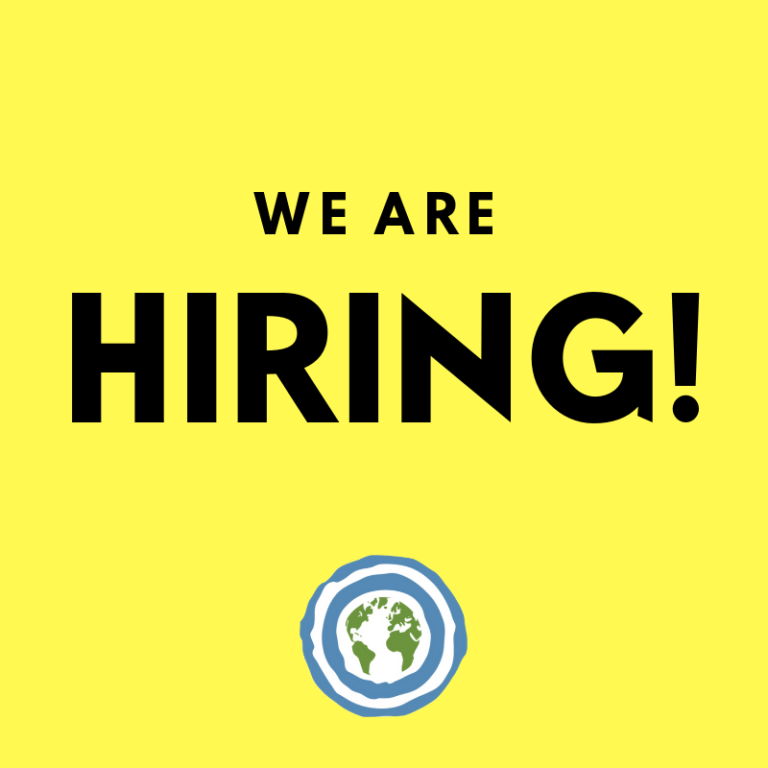
JHR is hiring a range of positions, all contract positions starting ASAP. Click below for details on each position:
JHR-TVO Covid Initiative Call for Pitches
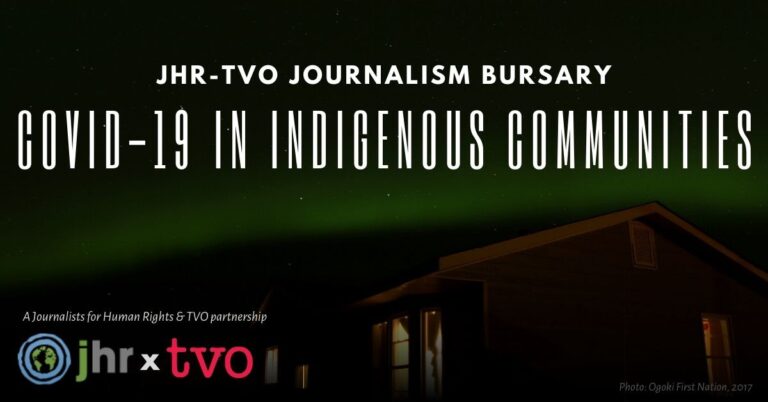
JHR and TVO.org have partnered on an initiative to support emerging Indigenous journalists in Northern Ontario.
Northern Ontario First Nations are dealing with unique challenges and creating unique solutions to the COVID-19 crisis. Through this initiative we aim to give a platform to some of those stories.
In their piece,
How First Nations are using radio in the fight against COVID-19, Crystal Hardy Zongwe Binesikwe – a two-spirit Anishnawbe storyteller, nurse practitioner, and PhD candidate from Biinjitiwabik Zaaging Anishnabek, in northern Ontario – delves into the role local radio is playing in communicating vital public health information to community members in isolated First Nations.
Applications to this initiative are open now and will be assessed on a first-come first-served basis. Early applications are strongly encouraged.
We are looking for original reporting and feature stories relating to COVID-19 in Northern Ontario First Nations. Selected stories will be published on the TVO.org website and on other TVO-branded platforms. Successful applicants will be supported through a JHR-facilitated pitch process and TVO mentorship.
Indigenous people (First Nations, Métis, Inuit) residing in Northern Ontario are eligible. Previous journalism experience is not required.
Application deadline: March 29, 2021
Apply Now! The Gordon N. Fisher/JHR Journalism Fellowship at Massey College 2021/2022
 2019/2020 Fellow Nancy Emefa Dzradosi
2019/2020 Fellow Nancy Emefa Dzradosi
The Gordon N. Fisher/JHR Journalism Fellowship at Massey College in the University of Toronto is an annual opportunity for a journalist from the following regions to participate in the William Southam Journalism Fellowship Program: Sub-Saharan Africa and the Middle East, with preference given to candidates from Liberia, Sierra Leone, Ghana, Tanzania, Malawi, South Sudan, DR Congo, Syria, Jordan and Indigenous candidates from JHR’s Indigenous Reporters Program. Funded by the Alva Foundation in memory of the former president and chief executive officer of the Canadian newspaper and communications company, Southam Inc., the grant allows the Fellowship to be held annually at Massey College and the University of Toronto under the auspices of Journalists for Human Rights.
2019/2020 recipient, Nancy Emefa Dzradosi, is a Ghanaian journalist who specializes in field reporting, anchoring and production. Her works focus on Human rights and Environment. Nancy currently leads Joy FM and Accra Metropolitan Assembly’s Clean Ghana Campaign. In 2018 and 2019, her stories on abandoned lepers and a mentally pregnant woman reignited national conversation on social exclusion. Nancy has a bachelor’s degree in Sociology and linguistics from the University of Ghana. She lives in Accra, Ghana.
Apply Now to the Media Girlfriends Fellowships
Media Girlfriends is a podcast company, network & student scholarship. Media Girlfriends support women & non-binary journalists. They work to promote more perspectives in Canadian media, particularly those by Black, Indigenous and other people of colour. Media Girlfriends started as a podcast by
Nana aba Duncan, currently a William Southam Journalism Fellow (see above) and formerly JHR’s country director in Ghana !
Journalism students: Apply for a new $10,000 CAD Media Girlfriends scholarship for Black high school students pursuing journalism at a post-secondary institution in Canada, and/or one of two $10,000 CAD Media Girlfriends scholarships for women/trans/non-binary students pursuing journalism, communications, media or tech. Deadline is April 30, 2021. More information, including how to apply, is at https://www.mediagirlfriends.com********************************
Land Acknowledgement
We wish to acknowledge the land on which the Journalists for Human Rights’ head office operates and recognize the longstanding relationships Indigenous nations have with these territories. For thousands of years it has been the traditional land of the Huron-Wendat, the Seneca, and most recently, the Mississaugas of the Credit River. Tkaronto (Toronto) is in the Dish with One Spoon Territory and is home to Indigenous peoples from many nations across Turtle Island who continue to care for this land today.
To read more on JHR’s land acknowledgement,
click here.
 2019/2020 Fellow Nancy Emefa Dzradosi
2019/2020 Fellow Nancy Emefa Dzradosi








